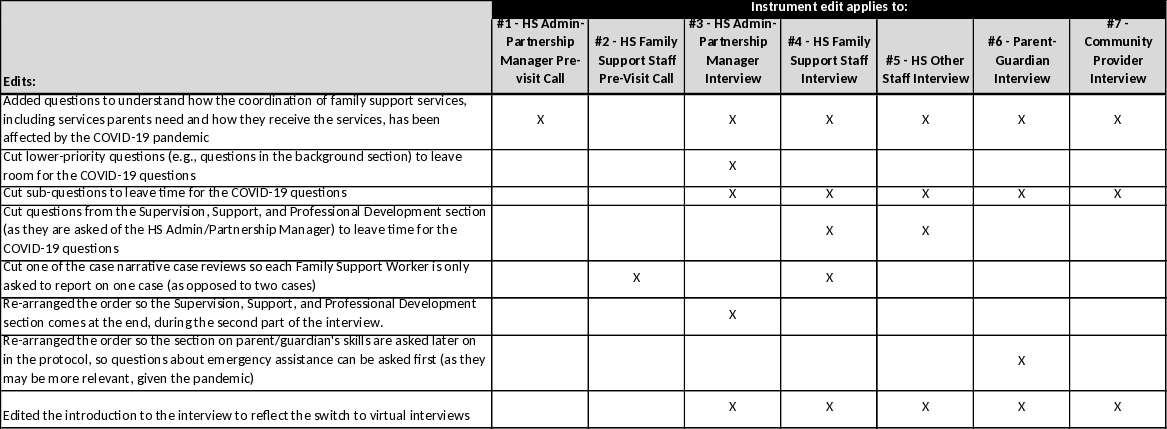Memo - NonSub Change_COVID-19
NonSub Change Request_HS Connects.docx
OPRE Research Study: Head Start Connects: A Study of Family Support Services
Memo - NonSub Change_COVID-19
OMB: 0970-0538
To: Josh Brammer
Office of Information and Regulatory Affairs (OIRA)
Office of Management and Budget (OMB)
From: Amanda Clincy Coleman
Office of Planning, Research and Evaluation (OPRE)
Administration for Children and Families (ACF)
Date: July 23, 2020
Subject: NonSubstantive Change Request – Head Start Connects [Case Studies] (OMB #0970-0538)
This memo requests approval of nonsubstantive changes to the approved information collection, Head Start Connects [Case Studies] (OMB #0970-0538).
Background
Head Start (HS) Connects received OMB approval for a new data collection to conduct case studies in six Head Start programs as part of the HS Connects: Individualizing and Connecting Families to Family Support Services research study on 01/03/2020 (OMB #0970-0538). The case studies will collect qualitative information about how Head Start programs, across varied organizational, community, and system-level contexts, coordinate family support services using processes and practices tailored to individual family needs. We plan to conduct interviews with HS Administrators/Family and Community Partnerships Managers, HS Family Support Workers, Other HS Center Staff, Parents/Guardians, and Community Providers at each case study site.
As the COVID-19 pandemic began, we were finishing all planned landscaping calls and were about to formally recruit our case study sites and begin conducting in-person site visits in Spring 2020. However, in response to the pandemic restrictions placed on travel and in-person work, we canceled the site visits. Given the uncertainty of in-person visits for the immediate future, we propose changing the mode of data collection from in-person site visits to virtual “site visits” where we would conduct interviews by video conference or, if needed, a phone call. We also propose editing the interview protocols to capture information about how the pandemic as affected coordination of family support services in HS.
Overview of Requested Changes
All instruments have been revised to include a few questions about how the COVID-19 pandemic may have affected the coordination of family support services, including the services parents need, the services HS programs offer, and the mode of service delivery. To maintain the original burden estimates, as well as to account for the interviews being virtual and thus needing to leave some time for trouble-shooting technology issues, the protocols were streamlined to cut out lower priority questions that indirectly address the research questions and to remove questions that are asked of multiple respondents if they could be asked of only one respondent. See Exhibit 1 for details on the types of changes made to each Instrument.
In line with the changes to the mode of data collection and switch to video conferencing, we also made the following specific edits to the supporting statements:
We originally planned on a 3-day site visit. We now aim to conduct all of the interviews for a given “site visit” within one week.
We will now conduct notetaking during all interviews instead of only during interviews where the respondent declines audiotaping.
We updated the anticipated timeline in Supporting Statement A.
We updated the timing of the submission of the Data Security Plan to ACF and receipt of IRB approval in Supporting Statement A.
We updated information on data handling in Supporting Statement B to accommodate data security of audiotapes captured during video conference calls.
We updated email communication with case study sites to accommodate the switch to a virtual site visit, including the addition of an email reminder about the pre-visit call. We also propose breaking the Head Start Administrator/ Family and Community Partnerships Manager interview into two parts, so we can wrap-up our virtual site visit and confirm the coordination processes learned via staff and parent interviews (Appendices G – I).
Time Sensitivities
Because our timeline for the case studies has been altered, this has implications for the timing of subsequent project activities that rely on completion of the case studies. We would like to aim to begin conducting virtual site visits in August 2020.
Exhibit 1. List of Changes by Instrument.

| File Type | application/vnd.openxmlformats-officedocument.wordprocessingml.document |
| Author | Jones, Molly (ACF) |
| File Modified | 0000-00-00 |
| File Created | 2022-09-12 |
© 2026 OMB.report | Privacy Policy